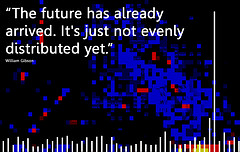 Does your recruiting or staffing organziation have Talent Intelligence?
Does your recruiting or staffing organziation have Talent Intelligence?
I believe that all staffing organizations should view and value their internal resume/candidate database/ATS as a proprietary business intelligence tool. Business intelligence refers to applications and technologies that are used to gather, provide access to, and analyze data and information and help companies develop consistent and “data-based” business decisions — producing better results than basing decisions on “guesswork.”
I define “Talent Intelligence” as refering to applications and technologies that are used to gather, provide access to, and analyze Talent-related (Human Capital) data and information and help organizations develop consistent and “data-based” Talent-related decisions.
Business intelligence applications are usually supported by a data warehouse, which is the main repository of an organization’s historical data, also known as corporate memory (the total body of data, information and knowledge required to deliver the strategic aims and objectives of an organization). A company’s “Talent Warehouse” should serve as the main repository of an organization’s Human Capital data, and it would serve as the raw material for a Talent Support System (TSS) – a computerized system for helping to make Talent-related decisions, such as talent identification and acquisition.
Practically every Fortune 1000 company (and many smaller ones too) utilizes and leverages business intelligence solutions to make better decisions and run their companies more effectively and efficiently. However, very few – if ANY – companies actually have a true Talent Intelligence solution. Although many Applicant Tracking Systems ,HRMS/HRIS solutions and Recruiting CRM applications make lofty claims as to their capabilities and functionality, I don’t consider many vendor solutions currently on the market to be a true Talent Intelligence solution. Most are simply systems that track and organize applicants.
I find it ironic that companies in nearly every industry invest millions and millions of dollars on their data warehousing/business intelligence initiatives – just to be able to retrieve and analyze their data to enable them to make better business decisions, yet I’d argue that every company’s Human Capital is actually their most valuable and critical asset. So why is it that HR, recruiting, and staffing technology is so far behind in technologies used for gathering, retrieving, and analyzing financial, manufacturing, etc., data? Continue reading →




 This question has been burning in my mind for quite some time – why is it that so many ATS/recruiting CRM vendors offer poor or limited candidate search functionality? I’m not talking about ATS vendors you’ve never heard of – I’m talking about some of the biggest names in Applicant Tracking/Candidate Relationship Management applications.
This question has been burning in my mind for quite some time – why is it that so many ATS/recruiting CRM vendors offer poor or limited candidate search functionality? I’m not talking about ATS vendors you’ve never heard of – I’m talking about some of the biggest names in Applicant Tracking/Candidate Relationship Management applications.